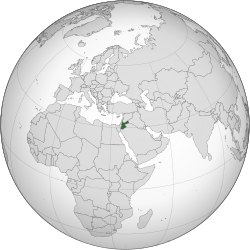| Name | Industry | Sector | Headquarters | Founded | Notes | Status |
|---|
| | |
|---|
| ABS network | Consumer services | Broadcasting & entertainment | Amman | 1993 | Broadcasting | P | A |
| Al Khalidi Medical Center | Health care | Health care providers | Amman | 1978 | Specialty hospital | P | A |
| Amman Stock Exchange | Financials | Investment services | Amman | 1999 | Primary exchange | P | A |
| Aqaba Railway Corporation | Industrials | Railroads | Aqaba | 1979 | Railway | P | A |
| Arab Bank | Financials | Banks | Amman | 1930 | Consumer and commercial bank. Market cap ≈ 4.34B JOD; Revenue ≈ 2.15B JOD | P | A |
| Arab Bridge Maritime | Industrials | Marine transportation | Aqaba | 1985 | Commercial transport | P | A |
| Arab Jordan Investment Bank | Financials | Banks | Amman | 1978 | Commercial banking. Market cap ≈ 0.22B JOD; Revenue ≈ 0.14B JOD | P | A |
| Arab Medical Center | Health care | Health care providers | Amman | 1994 | Medical center | P | A |
| Bank of Jordan | Financials | Banks | Amman | 1960 | Bank. Market cap ≈ 0.53B JOD; Revenue ≈ 0.16B JOD | P | A |
| Arab Potash Company | Basic materials | Chemicals & mining | Amman | 1956 | Potash mining. Market cap ≈ 2.90B JOD; Revenue ≈ 0.66B JOD | P | A |
| Cairo Amman Bank | Financials | Banks | Amman | 1960 | Bank. Market cap ≈ 0.29B JOD; Revenue ≈ 0.14B JOD | P | A |
| Central Bank of Jordan | Financials | Banks | Amman | 1964 | State-owned central bank | S | A |
| Fine Hygienic Holding | Consumer goods | Nondurable products | Amman | 1958 | Paper towel | P | A |
| Islamic International Arab Bank | Financials | Banks | Amman | 1998 | Islamic bank | P | A |
| Jordan Ahli Bank | Financials | Banks | Amman | 1955 | Bank. Market cap ≈ 0.26B JOD; Revenue ≈ 0.11B JOD | P | A |
| Jordan Insurance Company | Financials | Full line insurance | Amman | 1951 | Insurance. Market cap ≈ 0.03B JOD; Revenue ≈ 0.09B JOD | P | A |
| Jordan Kuwait Bank | Financials | Banks | Amman | 1976 | Bank. Market cap ≈ 0.47B JOD; Revenue ≈ 0.34B JOD | P | A |
| Jordan Petroleum Refinery Company | Oil & gas | Exploration & production | Zarqa | 1956 | Refinery. Publicly listed; Market cap & revenue available on ASE | P | A |
| Jordan Phosphate Mines | Basic materials | Specialty chemicals | Amman | 1953 | Phosphates, fertilizers, chemicals. Market cap ≈ 6.40B JOD; Revenue ≈ 1.26B JOD | P | A |
| Jordan Radio and Television Corporation (JRTV) | Consumer services | Broadcasting & entertainment | Amman | 1985 | State broadcaster | S | A |
| Jordan Telecom Group | Telecommunications | Fixed line telecommunications | Amman | 1997 | Telecommunication services | P | A |
| King Hussein Cancer Center | Health care | Health care providers | Amman | 1997 | Medical center | P | A |
| King Hussein International Airport | Industrials | Transportation services | Aqaba | 1972 | Airport | P | A |
| Logistaas | Software services | Transportation management system provider | Amman | 2015 | Software services | P | A |
| Mecca Mall | Consumer services | Broadline retailers | Amman | 2003 | Shopping mall | P | A |
| Queen Alia International Airport | Industrials | Transportation services | Amman | 1983 | Airport | P | A |
| Royal Jordanian | Consumer services | Airlines | Amman | 1963 | Airline | P | A |
| Rubicon Group Holding | Consumer services | Broadcasting & entertainment | Amman | 1994 | Educational media | P | A |
| Talal Abu-Ghazaleh Organization | Industrials | Business support services | Amman | 1972 | Project management, consulting, accounting | P | A |
| Umniah | Telecommunications | Mobile telecommunications | Amman | 2005 | Mobile operator; revenue per Batelco/parent group, market cap not standalone listed | P | A |


